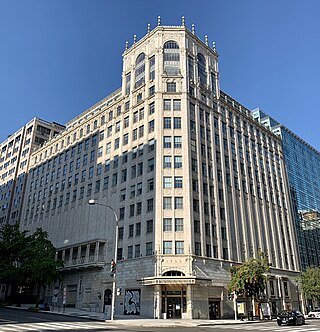Related Research Articles
The year 1942 saw a number of significant happenings in radio broadcasting history.
The year 1940 saw a number of significant events in radio broadcasting history.
The year 1949 saw a number of significant events in radio broadcasting history.
The year 1951 saw a number of significant happenings in radio broadcasting history.
The year 1934 saw a number of significant happenings in radio broadcasting history.
The year 1935 saw a number of significant happenings in radio broadcasting history.
The year 1937 saw a number of significant events in radio broadcasting history.
The year 1932 saw a number of significant happenings in radio broadcasting history.
The year 1943 saw a number of significant happenings in radio broadcasting history.
The year 1941 saw a number of significant happenings in radio broadcasting history.
The year 1927 saw a number of significant happenings in radio broadcasting history.
The year 1930 saw a number of significant happenings in radio broadcasting history.
The year 1938 saw a number of significant events in radio broadcasting.
The year 1945 saw a number of significant happenings in radio broadcasting history.
The year 1946 saw a number of significant events in radio broadcasting history.
The year 1944 saw a number of significant happenings in radio broadcasting history.
The year 1931 saw a number of significant events in radio broadcasting history.
The year 1933 saw a number of significant events in radio broadcasting.
The year 1936 saw a number of significant events in radio broadcasting.

On September 21, 1939, radio station WJSV in Washington, D.C. made an audio recording of its entire 19-hour broadcast day. This undertaking was a collaboration between the station and the National Archives, and it was the first time that such a comprehensive recording of a radio broadcast had been made. The station then donated its original set of recording discs to the National Archives, giving it a rare and complete artifact from an era frequently called the Golden Age of Radio. Due to their historical significance, the United States Library of Congress has since added these sound recordings to its National Recording Registry.
References
- ↑ Shirer, William L. (2011). The Rise and Fall of the Third Reich . New York: Simon & Schuster. ISBN 9781451651683.
- ↑ "From Poland". The Capital Times . Madison, Wisconsin. 16 June 1939. p. 15. Retrieved 10 February 2016– via Newspapers.com.

- ↑ Nord, Philip (2012). France's New Deal: From the Thirties to the Postwar Era. Princeton University Press. p. 250. ISBN 0691156115.
- ↑ Scales, Rebecca (24 February 2016). Radio and the Politics of Sound in Interwar France, 1921–1939. Cambridge University Press. p. 159. ISBN 978-1-107-10867-7.
- ↑ McDonough, Frank (1998). Neville Chamberlain, Appeasement, and the British Road to War. Manchester University Press. p. 89. ISBN 978-0-7190-4832-6.
- ↑ "Canada in the Second World War". Juno Beach Centre. 21 February 2014. Archived from the original on 16 September 2021. Retrieved 10 December 2015.
- 1 2 Kenny, Mary (2003). Germany Calling. Dublin: New Island.
- ↑ Palmer, Alan; Palmer, Veronica (1992). The Chronology of British History. London: Century Ltd. pp. 385–386. ISBN 0-7126-5616-2.
- ↑ "The BBC Story – 1930s" (PDF). Retrieved 31 May 2010.
- 1 2 Wilmut, Roger (1985). Kindly Leave the Stage!: Story of Variety, 1919–1960. Methuen. p. 132. ISBN 978-0-413-48960-9.
- ↑ Harold Oxley (1975). The Jamaican Government's Use of Radio Broadcasting in Economic Development, 1939–1970. University of Wisconsin—Madison. p. 118.
- ↑ "Radio: Cuba Joins". Time. 19 December 1939. Archived from the original on 15 January 2005.
- ↑ "Cox Purchase WSB, Slated for CBS" (PDF). Broadcasting. 15 December 1939. Retrieved 25 September 2014.
- ↑ "New KORN, Fremont, Neb" (PDF). Broadcasting. 1 January 1940. Retrieved 25 September 2014.
- ↑ The Eternal Vision: The Ultimate Collection of Spiritual Quotations. Hymns Ancient and Modern Ltd. 2002. p. 516. ISBN 978-1-85311-495-3.
- 1 2 Dunning, John. (1976). Tune in Yesterday: The Ultimate Encyclopedia of Old-Time Radio, 1925–1976. Prentice-Hall, Inc. ISBN 0-13-932616-2.
- 1 2 3 4 5 6 7 8 9 10 11 12 13 14 15 16 17 18 19 20 21 22 23 24 25 26 Dunning, John. (1998). On the Air: The Encyclopedia of Old-Time Radio. Oxford University Press. ISBN 978-0-19-507678-3. P. 8.
- ↑ H. Chignell (2 September 2011). Public Issue Radio: Talks, News and Current Affairs in the Twentieth Century. Springer. p. 50. ISBN 978-0-230-34645-1.
- ↑ Dickerson, Ian (2019). Sherlock Holmes and His Adventures on American Radio. BearManor Media. ISBN 978-1629335087.
- ↑ "New KVAK on the Air" (PDF). No. Broadcasting. 1 September 1939. p. 89. Retrieved 20 September 2016.
- ↑ "KOVO History Cards". Federal Communications Commission . Retrieved 18 April 2024.
- ↑ "WCAR, Pontiac, Mich. Takes Air on 1100 kc" (PDF). Broadcasting. 1 January 1940. p. 22. Retrieved 20 May 2016.
- ↑ John Dunning (7 May 1998). On the Air: The Encyclopedia of Old-Time Radio . Oxford University Press. pp. 309. ISBN 978-0-19-977078-6.
- ↑ "Scenes as 7500 Attend Chick Webb Benefit". news.google.com. The Afro American. 17 February 1940. p. 8. Retrieved 16 January 2019.
- ↑ Gerald Nachman (23 August 2000). Raised on Radio. University of California Press. p. 177. ISBN 978-0-520-22303-5.
- ↑ Christopher H. Sterling (2 December 2003). Encyclopedia of Radio 3-Volume Set. Routledge. p. 344. ISBN 978-1-135-45649-8.
- ↑ "Charles Dalmores, Former Opera Tenor. French Singer First Appeared in New York in 1906". The New York Times . 7 December 1939. Retrieved 14 December 2013.
Charles Dalmores, formerly famous as an operatic tenor in the United States and Europe, died today in the Hollywood Hospital after a stroke. ...
- ↑ Richard W. Barber (2002). King Arthur in Music. DS Brewer. p. 64. ISBN 978-0-85991-767-4.
- ↑ The Listener. British Broadcasting Corporation. July 1939. p. 1270.